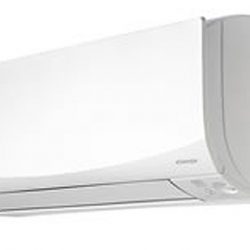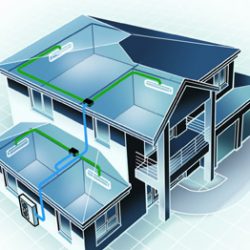Familiar household appliances are known noise sources. A dishwasher generates 46-decibels of agitated sound. In the next room, a vacuum cleaner is producing 72-decibels of dust-sucking noise. Outside, however, a pile of rustling leaves barely hits the 20-dB mark....
 Familiar household appliances are known noise sources. A dishwasher generates 46-decibels of agitated sound. In the next room, a vacuum cleaner is producing 72-decibels of dust-sucking noise. Outside, however, a pile of rustling leaves barely hits the 20-dB mark. We want the propagating sound to be like a whisper or a leaf rustling, not a busy vacuum cleaner. Fortunately, Daikin air conditioners have taken up that challenge.
Familiar household appliances are known noise sources. A dishwasher generates 46-decibels of agitated sound. In the next room, a vacuum cleaner is producing 72-decibels of dust-sucking noise. Outside, however, a pile of rustling leaves barely hits the 20-dB mark. We want the propagating sound to be like a whisper or a leaf rustling, not a busy vacuum cleaner. Fortunately, Daikin air conditioners have taken up that challenge.
When Noisy Appliances Rule
The deafening tones of that vacuum cleaner last for a few minutes, then they’re gone. It’s the same with the dishwasher. As for washer and dryer combos, the ones that create a 78-decibel racket, homeowners push these noisy appliances behind closed doors or into utility rooms. Air conditioners aren’t afforded that luxury. Sure, split systems place the primary cooling unit outside, but the sound still propagates along the ducts, almost as if they’re acting as an acoustic amplification channel. Technological solutions are required to minimise the vibrations.
Noise-Cancelling Technology
First of all, fan blades cut through the air. A mechanical turning effect presses down on lubricated bearings while a rushing sound funnels its way into the system. Daikin units neutralise the bulk of the spreading noise at the source by employing specially shaped fan blades and noise-reducing vents. Inverter technology and quiet operating indoor units further reduce sound pollution, thus delivering a climate-controlled environment that’s as whisper-quiet as it is warm. After all, an optimally formed thermal envelope won’t mean much if the room occupants’ comfort is disturbed by a turbulent output from a room vent.
What’s Your Noise-Managed Comfort Level?
We listed a few common noise levels when we opened this discourse because the decibel scale can feel a little abstract. What’s required is perspective, a means of relating these numbers to real world comfort levels. An intelligently adjusted AC unit, an appliance that’s loaded with modern features, should produce no more than 34 to 39-decibels of sound. Acoustically, that’s a dissonance-free environment. Above that mark, the sound becomes noticeable. Below that mark, the operating noise level fades into the background. Now, the fan and the inverter stage attenuate airborne turbulence and mechanical vibrations at the source, but there’s more that can be done.
In effect, the architecture of the Daikin split unit is already built to minimise noise pollution. As for the notion that there’s more to be done, we’re referring to the operational smarts inside the system. Adjustable fan speeds, for example, lower noise at night. Meanwhile, the inverter unit further shapes the thermal envelope. When all of these system parts work in concert, that 34-dB comfort point is achieved, but not at the cost of temperature control.
We specialise in distribution and installation of air conditioning, heating and cooling in the Bayside, Brighton, Elwood and Sandringham areas. We offer a 6 year guarantee on our quality workmanship with every installation. Contact us on (03) 9583 8555.
The post Operating Noise Levels of Air Conditioners: What Level Should Be Comfortable for You? appeared first on Bayair Electrics.









